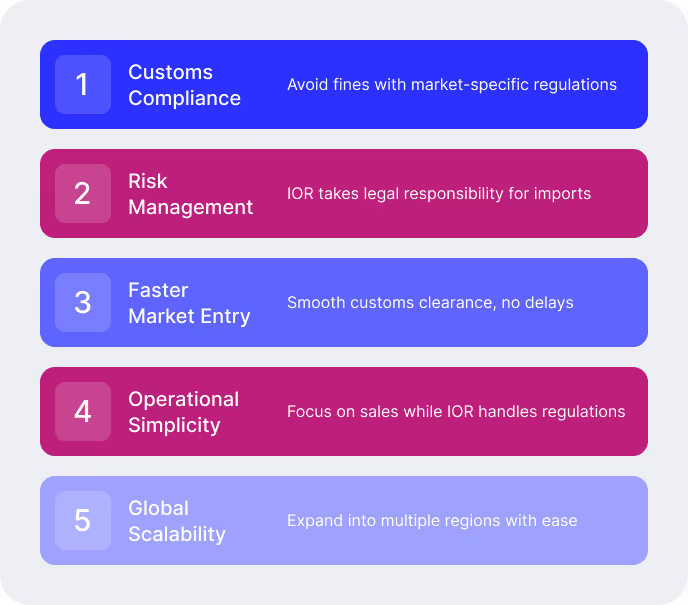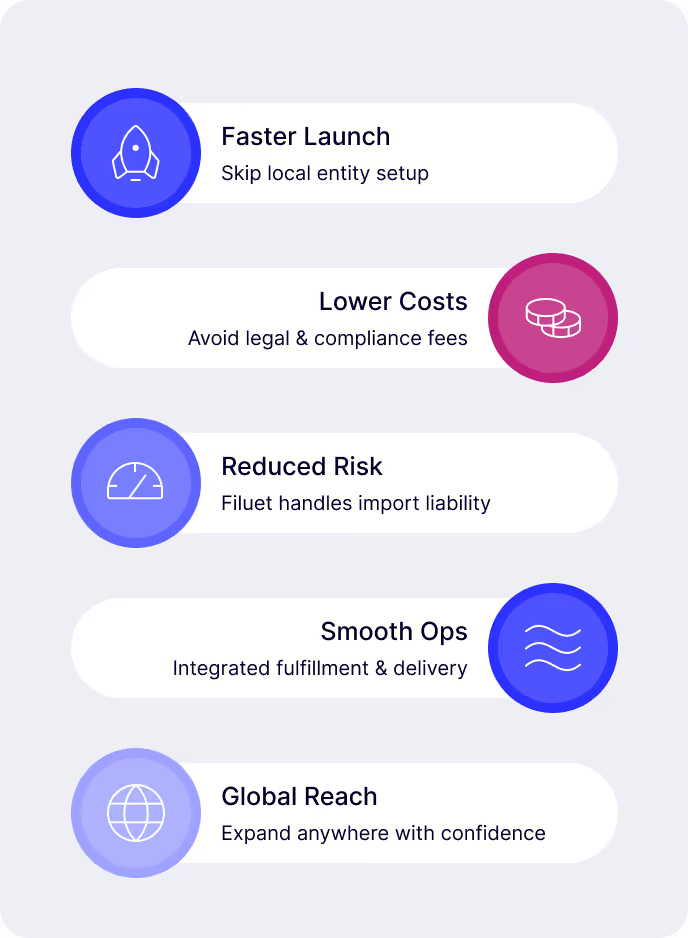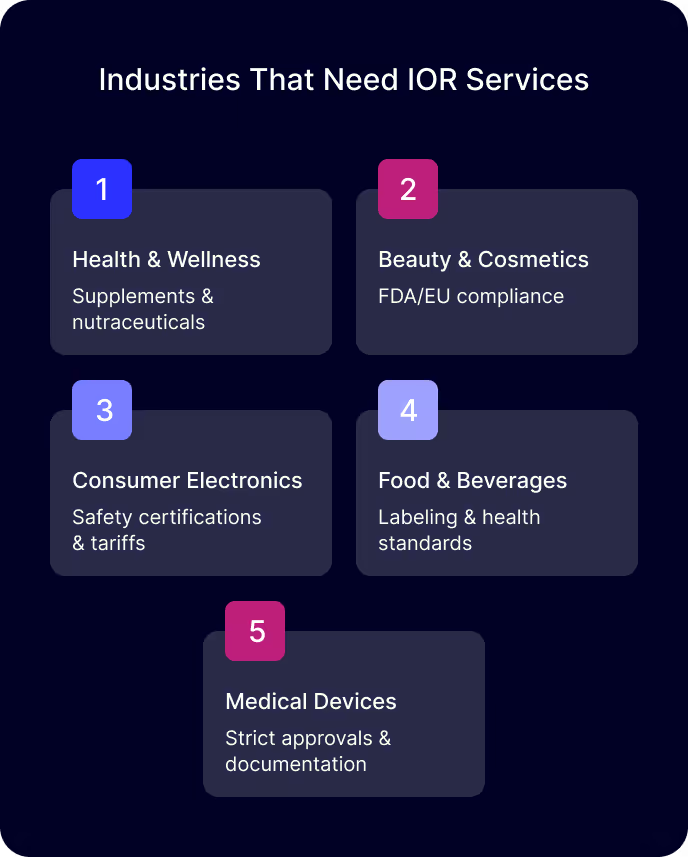Introduction: The Hidden Barrier in Global Expansion
Expanding into new international markets is exciting for any business. New customers, new revenue streams, and new growth opportunities await. But for companies selling physical products, entering new regions isn’t as simple as shipping goods across borders.
Every country has strict customs, regulatory, and tax requirements that determine whether your shipment clears smoothly or gets stuck at the border. This is where the role of the Importer of Record (IOR) becomes critical.
For many businesses, navigating the complexity of compliance is a major roadblock to global expansion. However, with IOR as a Service, companies can confidently enter new markets while staying fully compliant with local laws and regulations.
This article breaks down what IOR means, why it matters, and how to simplify global trade by acting as a trusted Importer of Record for leading brands internationally.
What is an Importer of Record (IOR)?
The Importer of Record (IOR) is the official entity or individual responsible for ensuring that goods entering a country comply with all local laws, regulations, and customs requirements.
The IOR is accountable for:
- Filing the necessary import documentation.
- Paying customs duties, tariffs, and taxes.
- Ensuring the products meet local compliance and certification standards.
- Handling audit risks if authorities inspect or question the import.
In short, the IOR is the legal gatekeeper for international shipments. Without a properly designated IOR, businesses risk delays, penalties, or even seizure of goods.
Why IOR Matters for Global Businesses
The Importer of Record plays a vital role in international trade. Without one, companies face significant barriers that can delay or even block their expansion plans.

- Customs Compliance – Each market enforces different rules; failure to comply can mean fines or product seizures.
- Risk Management – By taking on liability, the IOR shields businesses from regulatory consequences.
- Faster Entry – IOR services shorten the time it takes to move products into new markets.
- Operational Simplicity – Companies can focus on sales and growth while regulatory complexities are handled externally.
- Scalability – A reliable IOR makes it possible to replicate market entry across multiple regions at once.
Without an IOR, even well-planned strategies risk being slowed by compliance challenges. For businesses in highly regulated industries, this role is not optional—it’s essential.
For companies expanding into multiple countries, IOR plays a central role in ensuring smooth operations.
The Challenges Businesses Face Without an IOR
- Regulatory Confusion
Each country has different product certification and labeling requirements. For example, health supplements, cosmetics, and electronics all need different approvals. - Customs Delays
Shipments can be held indefinitely at ports if paperwork or compliance is missing. - Unexpected Costs
Incorrect tax or tariff filings can result in additional duties and penalties. - Legal Liability
If a shipment violates import laws, the business—not the courier—is held responsible. - Slow Market Entry
Lack of an IOR can delay launches by months, costing businesses valuable market opportunities.
This is where IOR expertise helps eliminate risk.
Simplifying Compliance in Global Trade
When expanding into new markets, companies face one of the biggest hurdles: import compliance. Every country has its own rules, requiring licenses, certifications, and documentation before products can legally enter. Managing this without a local presence can be slow, expensive, and risky.
This is where the Importer of Record (IOR) model comes in. An IOR acts as the official legal entity responsible for importing goods into a country. They take on tasks such as preparing customs paperwork, paying duties and taxes, and ensuring products meet local standards. In practice, this means businesses can sell in new regions without the time-consuming process of creating a legal subsidiary.
The IOR also assumes liability for shipments, providing audit protection and ensuring full transparency in the import process. For fast-moving industries, this model reduces complexity and accelerates entry into global markets.
Key Benefits of IOR Services
Using an IOR offers several advantages for companies looking to expand internationally:

- Faster Market Entry – Products can be launched without waiting months to establish a local entity.
- Cost Efficiency – Eliminates the need for costly registrations, licenses, and compliance consultants in every country.
- Risk Reduction – The IOR takes on legal liability, protecting companies from fines and penalties.
- Seamless Operations – The IOR model integrates easily with warehousing, fulfillment, and delivery.
- Global Scalability – Businesses can expand into multiple regions simultaneously, without regulatory bottlenecks.
Industries That Benefit Most from IOR Services
Certain industries are subject to stricter rules than others, making compliance a critical part of international expansion:

- Health & Wellness Products – Supplements and nutraceuticals must comply with safety and labeling standards unique to each country.
- Beauty & Cosmetics – Products often require FDA/EU registration, safety testing, and ingredient approvals.
- Consumer Electronics – Importation is tied to safety certifications, tariffs, and environmental compliance.
- Food & Beverages – Stringent labeling, health regulations, and import licenses govern entry into local markets.
- Medical Devices – Among the most regulated, requiring extensive approvals and documentation before distribution.
For these industries, a misstep in compliance isn’t just a financial risk—it can mean product recalls, reputational damage, or even permanent bans from a region.
Technology and Transparency in IOR
Leverage digital compliance tools and reporting systems to give businesses real-time visibility into:
- Shipment status
- Customs clearance progress
- Duties and tax breakdowns
- Compliance documentation
This level of transparency ensures that businesses can track their global trade with confidence and clarity.
Case Example: Seamless Market Entry
Consider the example of a global skincare brand aiming to expand into Asia. Despite strong demand, the company faced:
- Complicated import rules for beauty products.
- Long delays in customs clearance.
- No local legal entity to act as importer.
By working with an Importer of Record, the brand was able to centralize compliance, product certification, and customs procedures under one accountable partner. This reduced clearance times from weeks to days and allowed the company to launch across multiple Asian markets much faster than anticipated.
Common Myths About IOR
Myth 1: My shipping company can act as IOR.
In reality, most couriers and freight forwarders cannot assume legal responsibility for imports.
Myth 2: I only need IOR for restricted goods.
Even general consumer products require an IOR for customs clearance in most countries.
Myth 3: Setting up a local entity is always better.
Establishing a legal entity takes months and is expensive—using IOR enables faster, more flexible market entry.
The Future of IOR in Global Trade
As global trade regulations continue to evolve, having a trusted IOR partner will become even more critical. Countries are introducing stricter compliance frameworks, especially for regulated industries like healthcare and electronics.
Stays ahead of these changes by continuously updating its compliance processes and ensuring clients remain protected in every market.
Conclusion: Unlock Global Markets with IOR Confidence
Expanding globally is filled with opportunity, but also with risk. The Importer of Record plays a critical role in ensuring that products enter new markets legally, quickly, and without disruption.
With Filuet as your IOR partner, businesses gain:
- Peace of mind knowing compliance is fully handled.
- Faster time-to-market without local entity setup.
- Cost savings from avoiding regulatory missteps.
- Scalability to enter multiple countries simultaneously.
Global expansion doesn’t have to be complicated, Filuet makes it seamless, compliant, and scalable.
Ready to expand into new markets without the compliance headaches?Partner with Filuet’s IOR services and simplify your global growth journey today.
Frequently Asked Questions
Q1. What is the role of an Importer of Record?
An IOR is the official legal entity responsible for ensuring imported goods meet customs and regulatory requirements.
Q2. Do I need an IOR to ship products internationally?
Yes, in most cases. Without an IOR, your goods may be delayed, fined, or denied entry.
Q3. Can Filuet act as my company’s IOR in multiple countries?
Yes, Filuet provides IOR services across multiple global markets.
Q4. How does IOR reduce business risks?
By ensuring compliance, paying duties, and assuming legal responsibility for imports.
Q5. Which industries benefit most from IOR services?
Industries like health, beauty, electronics, food, and medical devices rely heavily on IOR for smooth cross-border entry.
.webp)
.avif)













